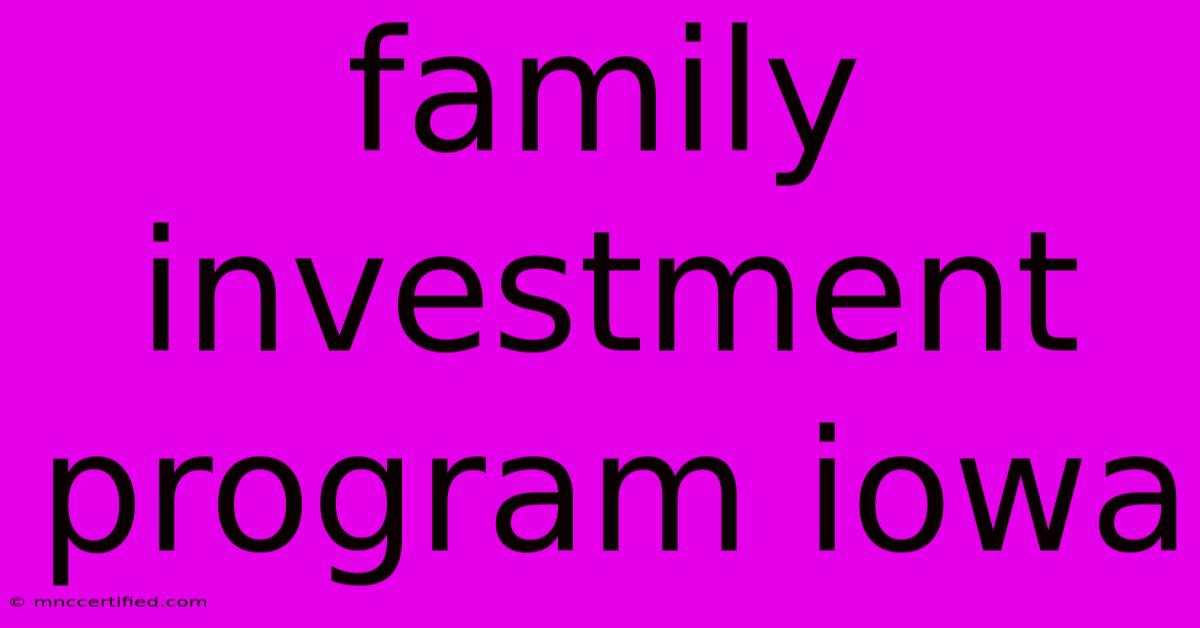Family Investment Program Iowa

Table of Contents
Family Investment Program in Iowa: A Comprehensive Guide
Iowa's Family Investment Program (FIP) provides crucial financial assistance to eligible families. Understanding its nuances is vital for those seeking support. This comprehensive guide clarifies the program's eligibility requirements, application process, benefits, and potential challenges. We’ll also cover frequently asked questions and provide resources for further assistance.
Understanding Iowa's Family Investment Program (FIP)
The FIP, formerly known as Temporary Assistance for Needy Families (TANF), offers temporary financial assistance to families with children. It aims to help families achieve self-sufficiency through a combination of cash assistance and supportive services. The program emphasizes work participation and emphasizes moving families towards economic independence.
Key Objectives of the FIP:
- Providing financial assistance: Supplementing income to meet basic needs like food, housing, and utilities.
- Promoting self-sufficiency: Helping families develop the skills and resources needed to become financially independent.
- Encouraging work participation: Supporting employment through job training, placement services, and childcare assistance.
- Strengthening families: Providing resources and support to improve family stability and well-being.
Eligibility Requirements for the Iowa FIP
Eligibility for the FIP is determined by several factors:
- Income: Your household income must fall below the established income limits. These limits vary depending on family size and are adjusted periodically. It's crucial to check the most up-to-date guidelines on the official Iowa Department of Human Services website.
- Resources: You must have limited assets. This includes savings, checking accounts, and other liquid assets.
- Citizenship/Immigration Status: Applicants must meet specific citizenship or immigration status requirements.
- Children: You must have dependent children under the age of 18 living in your household.
- Work Requirements: Most adult recipients are required to participate in work activities, such as job training, seeking employment, or working a part-time job. Exceptions may be made for parents with very young children or those with specific disabilities.
Applying for the Iowa Family Investment Program
The application process typically involves:
- Submitting an application: You can apply online through the Iowa Department of Human Services website or apply in person at a local county office.
- Providing documentation: Be prepared to provide documentation to verify your income, assets, and other information. This might include pay stubs, bank statements, birth certificates, and Social Security cards.
- Interview: You may be required to attend an interview to discuss your situation and eligibility.
- Verification: The Department of Human Services will verify the information you provided. This process can take some time.
Benefits and Services Provided by FIP
The FIP offers more than just cash assistance. Recipients may also qualify for:
- Cash benefits: A monthly payment to help cover essential expenses.
- Child care assistance: Subsidized childcare to allow parents to work or participate in training programs.
- Job training and placement services: Help in finding employment through job search assistance and vocational training.
- Medical assistance: Access to Medicaid healthcare coverage.
- Food assistance: Access to the Supplemental Nutrition Assistance Program (SNAP) benefits.
Challenges and Potential Difficulties
Navigating the FIP application and ongoing requirements can be challenging. Some common difficulties include:
- Complex application process: The application process can be lengthy and complicated.
- Strict eligibility requirements: Meeting all eligibility requirements can be difficult for some families.
- Work requirements: Balancing work requirements with childcare and other responsibilities can be stressful.
- Sanctions: Failure to comply with program requirements can lead to sanctions, such as a reduction or termination of benefits.
Frequently Asked Questions (FAQs)
Q: How long can I receive FIP benefits? A: The length of time you can receive benefits is limited and depends on several factors.
Q: What happens if my income increases? A: You are required to report any changes in your income or household situation promptly.
Q: Can I appeal a decision? A: Yes, you have the right to appeal a decision if you disagree with it.
Q: Where can I find more information? A: Visit the official Iowa Department of Human Services website for the most up-to-date information and resources.
Conclusion
Iowa's Family Investment Program plays a vital role in supporting low-income families with children. Understanding the eligibility requirements, application process, and available services is crucial for accessing this important assistance. Remember to always consult the official Iowa Department of Human Services website for the most accurate and current information. Don't hesitate to seek assistance from local social service agencies or community organizations for guidance in navigating the program.

Thank you for visiting our website wich cover about Family Investment Program Iowa. We hope the information provided has been useful to you. Feel free to contact us if you have any questions or need further assistance. See you next time and dont miss to bookmark.
Featured Posts
-
Arteta Double Arsenal Injury Boost
Nov 27, 2024
-
American Rare Earths High Grade Discovery
Nov 27, 2024
-
Sheffield Vs Oxford Live Championship Match Score
Nov 27, 2024
-
Commonwealth Life Insurance Co
Nov 27, 2024
-
Hibs Stun Aberdeen Dressing Room Reactions
Nov 27, 2024